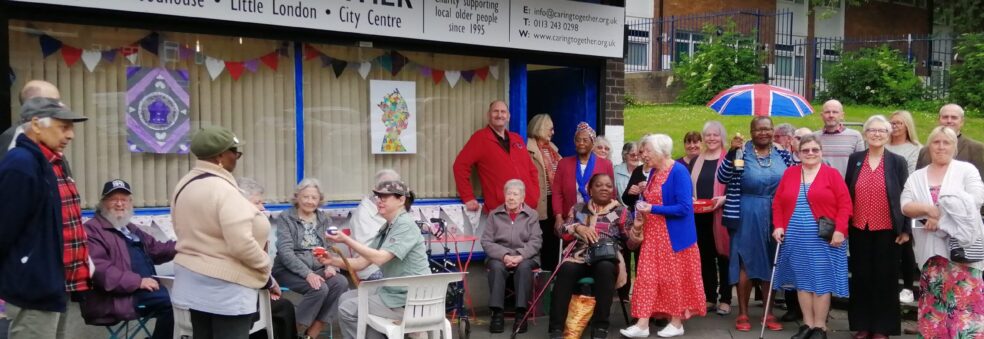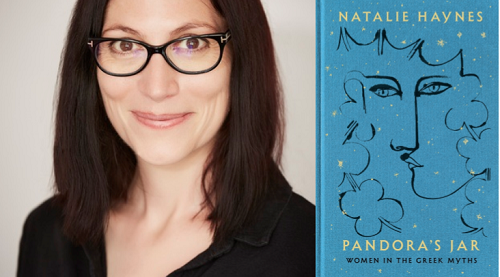
Meanwood Valley Urban Farm



Natalie Haynes Author Event – Wed 2 December, 7pm

Leeds Libraries are hosting this online talk and Q&A with Women’s Prize for Fiction 2020 shortlisted author Natalie Haynes, who will be discussing her new book ‘Pandora’s Jar: Women in the Greek Myths.’
Natalie is a writer and broadcaster. She is the author of five books including A Thousand Ships, which was shortlisted for the Women’s Prize for Fiction 2020, The Children of Jocasta and The Amber Fury, as well as a non-fiction book about Ancient History, The Ancient Guide to Modern Life. She has written and presented two series of the BBC Radio 4 show, Natalie Haynes Stands Up for the Classics.
The event is on Wednesday 2 December at 7pm. To book a free ticket for the event; www.ticketsource.co.uk/leedslibraryevents
A reminder that the Virtual Lights Switch On is tomorrow.

Leeds Christmas Lights Switch-on will be held virtually for the first time in its history on Wednesday 2 December at 6.30pm, bringing some much needed festive cheer to the residents of Leeds.
Streamed on the Millennium Square Facebook and YouTube channels, the 2020 online seasonal showpiece will feature performances from John Newman, Class Dynamix, The Dunwells, John Parr, Hyde Park Brass, Chante Amour, Alex Winters and Jez Edwards with appearances from local sporting heroes Leeds United, Josh Warrington and Leeds Rhinos and a recorded message from The Lord Mayor of Leeds and this year’s Leeds Children’s Mayor.
Click on the links at 6.30pm tomorrow to watch
Dear all,
Answers for yesterday’s ‘Monday Mind Workout’ which was multiple choice, how did you do?
1.Which of these means a speech in a play where a character talks to themselves rather than to other characters?
c) Soliloquy
2 In the Vicar of Dibley, what was the name of the vicar’s clueless friend?
a) Alice
3. How many novels did the Bronte sisters write in total?
b) Seven
4.Which breed of dog used to be sacred in China?
b) Pekingese
5.Who was the fourth Doctor Who?
(a) Tom Baker
6.Which coin was first issued on the 9th of June 1982?
(c) twenty pence piece
7. In 2005, a painting by artist Lucien Freud sold for £3.9 million pounds; who was the subject:
(b) a nude painting of Kate Moss
8. Proverbially, what is rubbed into the wound to make things worse?
c) Salt
9. What name is given to a country’s song played on official occasions?
a) National anthem
10. In fairy tales, which item is used to transport people through the air?
a)Magic carpet
11.Which of these was a successful pop star of the 1980s?
a) Adam Ant
12. ‘I Just Called To Say I Love You’ was a number one hit for which singer in the 1980s?
b) Stevie Wonder
13. Sandringham and Balmoral are residences of which public figure?
Queen
14.Stephenson’s Rocket was an early example of which means of transportation?
Train
15.Which animals metaphorically constitute a heavy rainstorm?
Cats and dogs
16.What is the reverse fold at the bottom of some trouser legs?
Turn up
17.If someone gets out of a difficult situation, he is said to have saved his what?
Bacon
18.Which of these symbolises the election of a new pope?White feathers
White smoke
19.Which ‘test’ was originally used to determine whether something was made of gold?
Acid test
20.If the information is from a reliable source, it is said to come straight from where?
Horse’s mouth
‘Leeds For All’, is a programme of free and inclusive activities to celebrate International Day of Disabled People this week.
The important day takes place annually on 3 December and is an opportunity for people across the world to celebrate the achievements and contributions of disabled people, as well as increase awareness, understanding and acceptance of disabilities.
This year in Leeds, local charity William Merritt Centre and Forum Central, a network of health and social care third sector organisations in Leeds, have put together a series of online, accessible, inclusive performances, stories, exhibitions, discussions, information and activities
The Leeds For All programme kicks off on Tuesday 1 December and continues through to Friday 4 December
All Events are FREE. Read more info here or download the full programme pdf.
There are also videos and activities you can get involved with at anytime during the celebration and beyond.
From 7pm Monday 30th November and available to watch for 48 hours
John Logan’s award winning West End and Broadway play RED. Starring Alfred Molina and Alfred Enoch.
RED: Alfred Molina reprises his acclaimed performance as American painter Mark Rothko in John Logan’s Tony-winning 2010 play, Red. Under the watchful gaze of his young assistant, Rothko takes on his greatest challenge yet: to create a definitive series of paintings for the Four Seasons restaurant. Molina is joined by Alfred Enoch (the Harry Potter series) as Rothko’s assistant Ken.
Dear all,
Today’s Monday Mind Workout is multiple choice, all the best
1.Which of these means a speech in a play where a character talks to themselves rather than to other characters?
a) Interlude
b) Revue
c) Soliloquy
2 In the Vicar of Dibley, what was the name of the vicar’s clueless friend?
a) Alice
b) Beatrice
c) Charlotte
3. How many novels did the Bronte sisters write in total?
a) Nine
b) Seven
c) Eight
4.Which breed of dog used to be sacred in China?
a) Cockapoo
b) Pekingese
c) Spaniel
5.Who was the fourth Doctor Who:
(a) Tom Baker
(b) Jon Pertwee
(c) Peter Davison
6.Which coin was first issued on the 9th of June 1982:
(a) two pound
(b) one pound
(c) twenty pence piece
7. In 2005, a painting by artist Lucien Freud sold for £3.9 million pounds; who was the subject:
(a) Marilyn Monroe
(b) Kate Moss (a nude painting)
(c) Kate Winslet
8. Proverbially, what is rubbed into the wound to make things worse?
a) butter
b) Vinegar
c) Salt
9. What name is given to a country’s song played on official occasions?
a) National anthem
b) National curriculum
c) National debt
10. In fairy tales, which item is used to transport people through the air?
a)Magic carpet
b)Magic mattress
c) Magic blanket
11.Which of these was a successful pop star of the 1980s?
a) Adam Ant
b) Billy Bug
c) Chris Cricket
d) Dave Dragonfly
12. ‘I Just Called To Say I Love You’ was a number one hit for which singer in the 1980s?
a) Stevie Marvel
b) Stevie Wonder
c) Sam Johnes
13. Sandringham and Balmoral are residences of which public figure?
Prime Minister
Queen
US President
14.Stephenson’s Rocket was an early example of which means of transportation?
Hovercraft
Bicycle
Train
15.Which animals metaphorically constitute a heavy rainstorm?
Frogs and toads
Cats and dogs
Lions and tigers
16.What is the reverse fold at the bottom of some trouser legs?
Turn on
Turn up
Turn off
17.If someone gets out of a difficult situation, he is said to have saved his what?
Ham
Bacon
Sausage
18.Which of these symbolises the election of a new pope?White feathers
White smoke
White doves
White Chocolate
19.Which ‘test’ was originally used to determine whether something was made of gold?
Reflex test
Acid test
Spelling test
20.If the information is from a reliable source, it is said to come straight from where?
Dog’s paw
Horse’s mouth
Pig’s ear
You are invited to ‘Hope, Home, Song’ which Shelter hope will be the UK’s largest carol concert. Tune in from the comfort of your own home at 7pm on Thursday 3 December
If you would like to join in you can register here: https://england.shelter.org.uk/support_us/carol_service#carol_service_form
The ‘Home Hope Song’ concert will be hosted in the candle-lit church of St Martin-in-the-Fields in London, where Shelter was founded in 1966. It will run for forty-five minutes, and be streamed via Shelter’s website. The service will be hosted by DJ and long-time Shelter supporter Edith Bowman.
Many Christmas traditions are unable to go ahead this year. But Shelter hopes that encouraging thousands of people and families to come together to create the UK’s biggest virtual carol concert can be a new moment of festive connection for the nation.
The stream will be interspersed with stories from those who’ve been helped by the charity, along with guest appearances from the likes of Julie Walters, Stephen Fry and Rob Rinder.
The concert is free to watch but any donations made will support Shelter’s work. And event sponsors Nationwide Building Society will match pledges up to £43k.

Plans are underway to roll out a vaccination that will protect people from coronavirus.
Healthwatch Leeds want to hear the views of people in Leeds to help with local planning.
If you would like to take part in the survey you can do so here
And you can read the Healthwatch Leeds November newsletter here
This week is the start of the Tony Award Winners season with The Shows Must Go On with the classic Tony Award Winning production of An American in Paris!
This breathtakingly beautiful Tony Award®-Winning Broadway Musical, inspired by the Oscar® winning MGM film, tells the impassioned story of discovering love in the ‘City of Light’. Featuring the gorgeous music and lyrics of George and Ira Gershwin (including the classic hits ‘S Wonderful and I Got Rhythm), stunning designs, and show-stopping choreography. Jerry Mulligan is an American GI striving to make it as a painter in a city suddenly bursting with hope and possibility. Following a chance encounter with a beautiful young dancer named Lise, the streets of Paris become the backdrop to a sensuous, modern romance of art, friendship and love in the aftermath of war.
Starts tonight Friday 27th November) at 7pm and available to watch for 48 hours